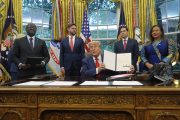
While the U.S. Senate continues to enjoy a full week of vacation, the U.S. House of Representatives has resumed regular business and plans to begin the annual appropriations process of voting on 13 appropriations bills, the first of which is the Homeland Security bill and the Military Construction and Veterans’ Affairs bill. The House will also be voting on a bill to increase the debt ceiling later this evening.
According to C-Span.org:
The House will also vote later tonight on a bill to increase the debt ceiling by $2.4 trillion dollars. The measure, offered by the head of the Ways and Means Committee, Rep. Dave Camp (R-MI), will not include any cuts to spending. The vote is largely symbolic and is a test vote to challenge Democratic lawmakers’ position as the Republican-dominated House has indicated it would not support an increase to the debt ceiling without reductions to spending.
Treasury Secretary Timothy Geithner insists that the federal government must address the debt ceiling before the August 2 deadline is reached in order to prevent the United States from defaulting on its loans. The country will officially be hitting the debt ceiling at the end of this month, but Geithner allegedly has plans to halt investments in two government pension plans in order to maintain a steady cash flow.
The bill poised for a vote today simply reads:
A BILL To implement the President’s request to increase the statutory limit on the public debt.
Be it enacted by the Senate and House of Representatives of the United States of America in Congress assembled, SECTION 1. FINDING.
The Congress finds that the President’s budget proposal, Budget of the United States Government, Fiscal 6 Year 2012, necessitates an increase in the statutory debt limit of $2,406,000,000,000.
SEC. 2. INCREASE IN STATUTORY LIMIT ON THE PUBLIC DEBT.
Subsection (b) of section 3101 of title 31, United States Code, is amended by striking out the dollar limitation contained in such subsection and inserting in lieu thereof $16,700,000,000,000.
The symbolic vote is taking place as Vice President Joe Biden is carrying on bipartisan discussions on a plan to reduce the national deficit.
USA Today reports that the vote is intended to “put President Obama and Democrats on the political hot seat.” The vote is taking place just one day before the President is set to meet with the entire House GOP conference, the first time since the midterm elections.
Speaker of the House John Boehner (pictured above) has adamantly declared that any increase to the debt limit should be accompanied by spending cuts of trillions of dollars and other significant budget reforms. According to Boehner, everything is open for discussion, with the exception of tax increases.
“That means no debt limit increase without meaningful budget reforms and serious spending cuts in excess of any increase in the debt limit,” he declared.
“We have also demonstrated again that cutting is just not enough,” explained House Majority Leader Eric Cantor (R-Va.). “We’ve got to grow the economy. We’ve got a plan. Where’s theirs?”
The bill is not expected to garner a single Republican vote, and with just 192 Democratic members, the measure has no chance for passage. To be safe, however, the Republican leadership structured the vote so that it requires two-thirds of the majority for passage by putting the bill on the special “suspension” calendar.
Representative Peter Welch (D-Vt.) bemoans the Republican effort to guarantee a failed vote:
The clock is ticking away to Aug. 2. If we fail to increase the debt limit and default, America for the first time will not be able to pay its bills,” said Welch. “If this [vote] has the fundamental objective to be 30-second attack ads, then members will see it for what it is.
A poll by the Pew Research Center indicates that Americans are increasingly becoming concerned by a potential raise to the debt limit as it may encourage greater spending and increased debt. In fact, more Americans are concerned by that consequences of raising the debt ceiling than by the potential for causing government default and damage to the economy that would allegedly result by failing to raise the ceiling.
The Pew Center explains of the poll:
By a 48 percent to 35 percent margin, Americans say their greater concern is that raising the debt limit would lead to higher government spending and a larger national debt than that not raising the limit would force the government into default and hurt the nation’s economy.
Meanwhile, any efforts to rein in spending have been stopped in their tracks. Last week, the Senate voted on four different budget proposals by Representative Paul Ryan, President Obama, Senator Rand Paul, and Senator Pat Toomey, all of which failed.





